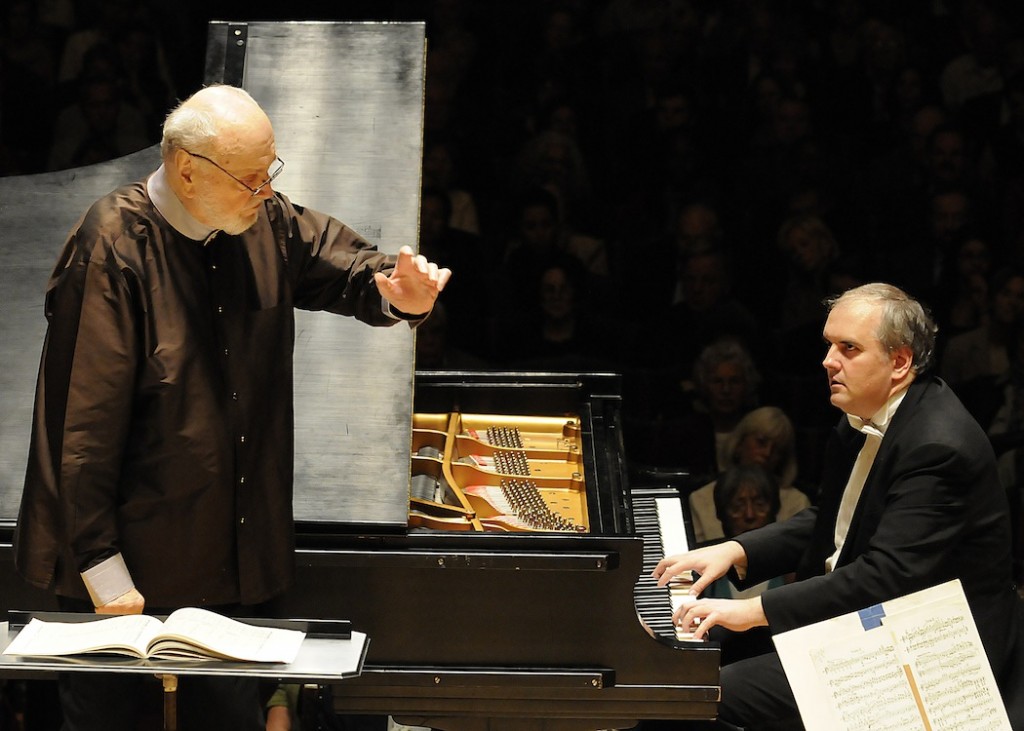Angelich and Masur prove congenial partners in Brahms

Kurt Masur conducts the BSO in Brahms' Piano Concerto No. 2 Thursday night with soloist Nicholas Angelich. Photo: Stu Rosner
Nicholas Angelich got the call that every professional pianist wants: “It’s the Boston Symphony Orchestra. Are you free next week?”
Substituting on short notice for the injured Yefim Bronfman, Angelich stepped in to perform Brahms’ mighty Piano Concerto No. 2, with conductor Kurt Masur Thursday evening at Symphony Hall.
It’s no small feat filling in for the formidable Bronfman, but Angelich is no ingenue. The forty-one year old American was making his BSO debut with these performances, which is something of a surprise, and long overdue. But he has already graced many of the world’s major stages, including a New York Philharmonic debut nearly a decade ago, also under Masur. So while the concert had the shimmer of last-minute excitement, there certainly was no question of Angelich’s capabilities.
The Brahms Second is not a work for piano divas. The soloist vies for musical attention with individual passages for horn, clarinet, flute and, especially cello, as well as competing with a richly textured orchestral part. In the opening bars, the first of two major themes gets introduced by the French horn (expressively rendered by principal James Sommerville). The soloist responds, coloring the phrase in but then sits in silence while the orchestra goes through an extended rumination on the second theme. And so the Second Concerto goes throughout four movements—an exchange of musical ideas among peers.
Angelich, for his part, maintained his place as collaborator—not easy when you’re front and center. His touch was precise and phrases sharply turned. The part doesn’t call for much bombast, and Angelich did not fabricate any. It was surprising how the conductor and the soloist interacted with such seemingly little effort, but Masur kept it together by letting the music breathe.
Tempos were decidedly relaxed—Masur has always been a thoughtful conductor, an approach well suited to this understated masterpiece. In Angelich he found a suitable partner—a soloist who would defer to the score. The precision of the pianist’s trills, and ease at which Angelich drew out the musical lines, made it clear that he could be a player of flashy brilliance in more overtly virtuosic music.
Flutist Elizabeth Rowe and clarinetist Tom Martin both played elegantly, providing the melodic foils in the second movement. Topping them all in breadth and emotional intensity, cellist Jules Eskin sketched out a wistful, cantabile line, set off against both soloist and orchestra.
It was an all-Brahms evening, with the Third Symphony after intermission, and Masur showed no inclination to hurry that work along either. The accent was on articulate phrasing, and clearly stated individual voices. In Masur’s hands, the Third felt even more like a piece of chamber music than usual, with large forces molded adeptly into more modest units. Although the pace was stately, the symphony still retained a condensed quality.
Masur’s style has always been casual with the beat and with entrances—perhaps trusting is a better way of putting it. His rhythmic direction comes largely from gentle body movements, rather than bold arm waving, and he seems to be even more disposed to this in recent years (the German conductor turned 84 this summer). It may not suit every orchestra, but the BSO has always responded well to Masur, and a warm standing ovation after the symphony—not a work with the most rousing conclusion—showed that Boston audiences still do so as well.
The program will be repeated 1:30 p.m. Friday and 8 p.m. Saturday. bso.org; 617-266-1492.
Posted in Performances




